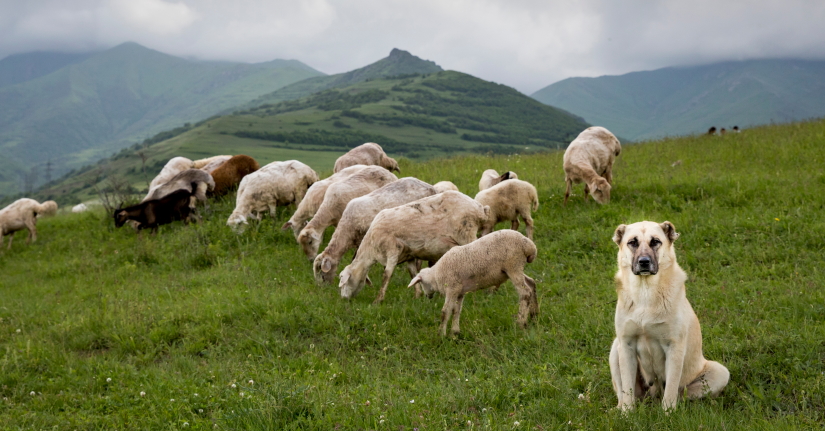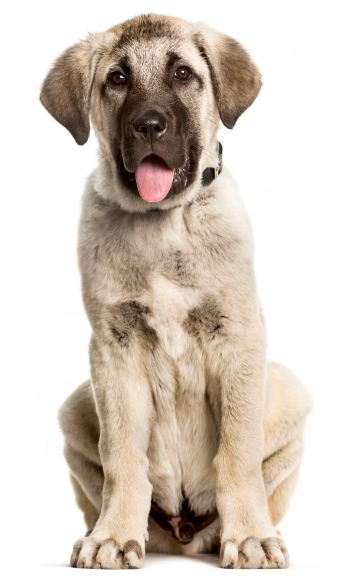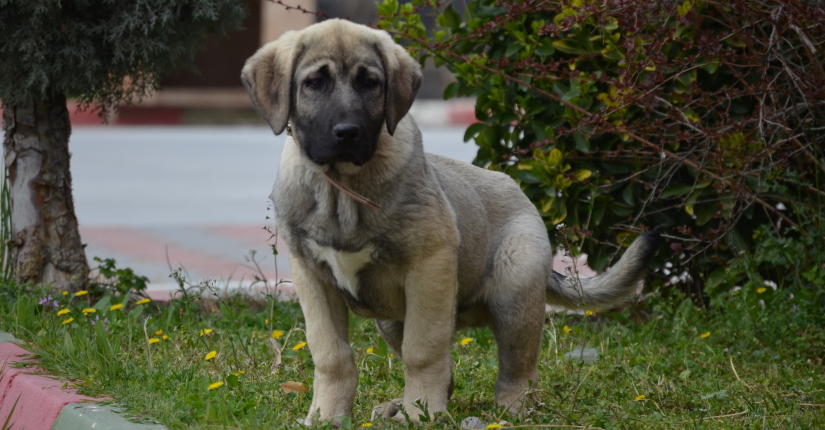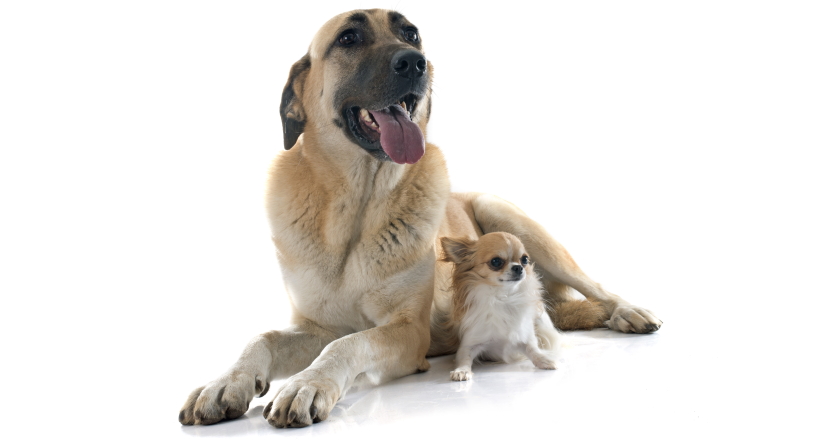Loyal, independent, and reserved, the Anatolian Shepherd originated from Turkey and was bred to guard sheep. This breed is loyal and territorial. The Anatolian Shepherd has a long history and began in the US right after WWII when the Department of Agriculture imported a pair of Anatolians.
According to the AKC, ancient artifacts go as far back as the Babylonian Empire’s days, documenting this breed’s ancestors. There are Assyrian bas-relief carvings housed in the British Museum. This breed belongs to the UKC Guardian Dog Group and is a member of the AKC’s Working Club.




Brief History
The Anatolian Shepherd was initially bred in Anatolia, or Asia Minor, a peninsula in the Asian part of Turkey. It is a high plateau area of land with hot brutal summers and snowy sub-zero winters that are harsh.
The Anatolian did well in this climate. During this early civilization, goat and sheep herders developed a breed called the Chan Kopegi, also known as Shepherd’s dog. This breed is the forerunner of the Anatolian Shepherd dog breed.
Physical Description
The Anatolian Shepherd is a large and powerful dog breed that was bred for endurance and agility. This is a working dog breed that has a unique ability to guard livestock without harming them. The breed is calm yet bold with an even temperament unless challenged.
With plenty of size and bone, the well-muscled Anatolian has a powerful head with fluid movement. The Anatolian Shepherd needs to be rectangular, with proportion to height. Measurements with weight and size apply from two years of age and up.
The almond-shaped eyes should be medium-sized and can be either dark brown or light amber. This breed should not have blue eyes or two different colored eyes. The V-shaped ears have a rounded apex and measure from 4 to 6 inches in length.
Ears are dropped to the sides. The Anatolian should not have erect ears. This breed has a deep chest and block-shaped muzzle without the head being sniped. The tail is long and reaches the hocks, while the back is powerful, muscular, and flat. The coat is short with a thick undercoat.
There is long hair on the neck and mane parts. The Anatolian may have feathering on the ears, legs, and tail. There are all color patterns with cream, tan, piebald, usually with a black mask most common. The Anatolian Shepherd has a powerful and fluid gait.
Temperament

The American Kennel Club (AKC) adds that “Alert and intelligent, calm and observant. Instinctively protective, he is courageous and highly adaptable. He is very loyal and responsive. Highly territorial, he is a natural guard. Reserve around strangers and off its territory is acceptable.”
The smart and responsive Anatolian adapts easily and tends to protect the flock, livestock, small children, and small pets with intensity. Pet parents to this breed must be knowledgeable and should socialize and positively train pups from a young age.
Special Needs
This breed may be sensitive to anesthesia. The Anatolian Shepherd should never be trained for attack work because of their strong protective drive. That said, this breed needs to be socialized early on during puppyhood by taking them on errands, meeting friends, and playing at the dog park with other dogs and people. The Anatolian Shepherd needs to be on farms with large homes and families that are active lifestyles.
This breed may be difficult during adolescence and needs dog training and plenty of fun off-leash runs, agility classes, and long hikes. It was bred to work independently on farms and make his own decisions. Initial training may be problematic. The Anatolian Shepherd adores being with his dog’s parents and having a set schedule.
Possible Health Concerns
Although this is a strong and powerful dog breed, the Anatolian Shepherd may be susceptible to the following health hereditary health conditions:
- Entropion: This is the turning in of the edges of the eyelid. The eyelashes then will rub against the eye surface. This condition can be inherited. Surgery may correct the defect.
- Dilated Cardiomyopathy: is an acquired disease that results in the progressive loss of the heart’s muscles’ ability to contract. Causes are unknown, and in the early phases, there are no symptoms. This is one of the most common canine heart diseases and is mostly seen in middle-aged dogs, with more males being affected than females.
- Signs include fainting, breathing difficulties, weakness, collapse, accumulation of lung fluid, and coughing. Affected dogs are also not willing to exercise.
- Hypothyroidism: This happens when there are lower levels of thyroid hormones. Signs are hair loss, a dull coat, flaky skin, together with weight gain, and loss of muscle. Reach out to your veterinarian for advice if your Anatolian Shepherd shows any of these symptoms.
- Cancer: This breed may be predisposed to osteosarcoma, lymphosarcoma, mastocytoma, melanoma, histiosarcoma, and hemangiosarcoma.
- Anesthesia Sensitivity: This dog breed may be sensitive to anesthesia and sedation. Discuss with your vet before any surgery.
- Bloat: This breed is deep-chested and thus more prone to bloat. Bloat is a life-threatening emergency. Stress is also a significant factor in causing bloat. Don’t feed your Anatolian a big meal, followed by exercise.
If your dog starts dry vomiting, suffers from restlessness, and discomfort, contact your emergency veterinarian. Don’t wait for a few hours. This is a real emergency that is life-threatening!
Exercise

The Anatolian Shepherd is an energetic dog breed that does well with plenty of daily exercise and dog sports. It’s essential to keep your Anatolian mentally stimulated. This dog breed was bred to run long distances and herd cattle, so plenty of off-leash exercises is good for well-being if you don’t live on a large property.
Although this dog breed is independent, pet parents should not leave their dogs outside all day. This breed needs regular exercise and thrives on being with his pet parent. It is a one-person dog breed that does well with agility, herding, obedience training, tracking, and Frisbee. This dog breed also enjoys regular fun family outings like playing Frisbee at the beach.
Puppy Anatolians under six months of age need special exercise programs specially tailored for puppyhood to prevent hip dysplasia and other sports and exercise injuries. Consult with your veterinarian as to the best canine sporting activities for your dog.
Nutrition
Feed your Anatolian Shepherd the best high-quality dog food that you can afford. This breed tends not to overeat, yet all commercial dog food diets should be for your dog’s specific life stage (puppy, adult, or senior). Healthy treats work well during positive dog training. As usual, ensure that there’s always fresh water provided each day.
Here are some feeding tips to follow:
- There is no “best diet”- dogs are individuals. A diet that works for one active dog breed may not be the best for another. Age, energy level, and individual medical concerns play a large role for each patient.
- The recommended guidelines on bags often contain more calories than some Anatolian Shepherds need. Check with your veterinarian for the best nutritional advice, most especially if your dog participates in canine sports.
- Feed a complete and balanced food for the appropriate life stage of your dog.
Puppies of large-sized dogs breeds like the Anatolian Shepherd grow very fast. Rapid growth can be harmful to a dog’s body, causing large-sized dog breeds to suffer from orthopedic problems like hip and elbow dysplasia at some stage in their lives.
Avoid adding too many calories and calcium supplements. Some supplements may increase the growth rate of your puppy, causing bones to grow too fast. This results in less dense bone, which is weaker and is more prone to degenerative disease.
Overweight dogs may need to cut down on treats. Keep in mind that if your dog is not very active and is a senior dog, maintaining muscle mass is still essential. Some senior dogs may have kidney problems.
That said, they will need to have a limited protein intake every day. Today there are numerous senior-formulated dog foods for large and giant-sized breeds that contain low protein. Consult with your veterinarian before any dietary changes to ensure that your dog gets the right amount of nutrients and vitamins.
All dog parents, regardless of the breed, need to understand that the life stage that dog food is marketed for may not be the same life stage for which the food meets the minimum requirements.
General ingredients that include whole meats, fruits, or vegetables in their top five components are considered the right foods. Those that also incorporate antioxidants like blueberries, cranberries, pomegranates, and pumpkin are also becoming popular. That said, organic, natural, and preservative-free with no artificial ingredients are also key to a well-balanced and high-quality dog food!
If you want natural, organic, and holistic dog food, dry dog food brands offer many varieties – grain-free, gluten-free, vegetarian, and traditional. Dry dog food is available through most pet food brands.
Look for the following when choosing high-quality dog food for your dog.
- Healthy ingredients
- Fresh meat
- Vegetables and fruit
- No controversial ingredients
- No added hormones and steroids
- No unnamed meat sources
- The right ratio of macronutrients
- By-products in dog food are acceptable when they are organ meats
- Dog food should not be overly processed
- Look for glucosamine and chondroitin for hip and joint wellness for older dogs.
Consulting with your veterinarian about the best options in canine nutrition is always best.
Grooming

This breed has a thick undercoat that protects him from the cold. Some dogs will have a longer undercoat. Generally, grooming is easy, and daily brushing will keep your dog looking good.
Bathing should be as needed depending on how active your dog is Shedding will occur twice a year from the undercoat, and there will be a lot of shedding. It’s imperative to brush twice daily to remove all the dead hair and keep your home hair-free during shedding.
Monthly trimming is needed to trim the hair on the feet, head, and tail area. Fleas, ticks, and mites are some of the parasites that you will often encounter if your dog is not on a flea and tick control product. That said, educate yourself as to the healthiest, non-toxic products available. Grooming needs to start during puppyhood so that your dog will be comfortable with being handled as he gets older.
Grooming also allows for dog parents to check for lumps and tumors that may be cancerous. If bathing a puppy, fun colored dog toys will make bathing more fun. Add in some music, and reward your dog after each bath.
Natural shampoos and conditioners will allow for a healthier coat. Teeth need to be brushed daily, and for dogs that don’t enjoy this, there are plenty of new canine dental products available that don’t entail brushing and are just as effective. Nail trimming is a must and can be done at the veterinarian or groomers. Consult with your veterinarian about the best grooming and flea and tick meds needed for this wonderful dog breed!
Adopting an Anatolian Shepherd
This breed is an intelligent, active, and alert dog breed that may be stubborn. That said, Anatolian Shepherd needs experienced dog parents. This is a terrific dog breed that needs to be continuously rewarded for good behavior. This dog breed is healthy and may become restless and bored without a regular exercise schedule.
The Anatolian Shepherd will adapt to home life with a sporty active new pet parent in no time, as long as he’s given plenty of daily exercise. He does well on a farm or on a property that has a large backyard. This dog breed should never be confined to apartment living.
This breed learns quickly and enjoys dog training classes. This is a wonderful dog breed that needs caring pet parents that are dog experienced. Agility, tracking, herding, long runs, off-leash hikes, herding competitions, and flyball are fun sporting activities for this dog breed.
As with any shelter dog, your dog may have some quirks. These may include:
- House –Training lapses
- Digging
- Nipping
- Chewing
- Training issues
- Aggression though very doubtful because this breed is so gentle
- Nervousness around people depending on the dog’s history
- Food aggression depending on the history
When adopting a senior Anatolian Shepherd, it’s best to work together with your veterinarian to determine the best ways of helping your dog with age-related ailments. Twice yearly physicals are recommended. During these physicals, nutritional and exercise needs for your senior dog should be addressed. Your newly adopted dog will cherish all the pampering and love!
As usual, make sure that you have the time and resources to take good care of your rescue before adopting!
Anatolian Shepherd Rescue Groups
National Anatolian Shepherd Rescue Network
- Address
- Higley, AZ, USA
- Website
- www.nasrn.com
- Phone
- (480) 9870626
- asdrescue@gmail.com
Anatolian Shepherd Breeders in the USA
Skyview Farm (Virginia)
- Address
- Maidens, VA
- Website
- www.skyviewanatolians.com
- Phone
- (804) 2636270
- catherine@skyviewanatolians.com
Karaboudjan Anatolians (California)
- Address
- Valley Center, CA
- Website
- www.karaboudjananatolians.com
- Phone
- (760) 5754273
- karaboudjananatolians@gmail.com
HFO Anatolians (Ohio)
- Address
- Columbus, OH
- Website
- www.greenakersfarm.com
- Phone
- (614) 2670632
- greenakersfarm@me.com
Autumn Acres Ranch (Oklahoma)
- Address
- Stilwell, OK
- Website
- www.autumnacresanatolians.com
- Phone
- (918) 5072812
- hardin.agrienvmgmt@gmail.com
Lower Forty Farms (South Carolina)
- Address
- Cameron, SC
- Website
- www.breedercloudpro.com/lowerfortyfarms
- Phone
- (843) 7093239
- lowerfortyfarms@gmail.com
Full Circle Farm (South Carolina)
- Address
- Simpsonville, SC
- Website
- www.anatoliansofrowland.com
- Phone
- (910) 2582972
- fullcirclefarm@bellsouth.net
All Natural Farms (North Carolina)
- Address
- Cornelius, NC
- Website
- www.allnaturalfarms.org
- Phone
- (843) 9915066
WhiteKnight Guardians (Tennessee)
- Address
- New Tazewell, TN
- Website
- www.whiteknightguardians.com
- Phone
- (423) 5262093
HurCompany (Texas)
- Address
- Commerce, TX
- Website
- www.hurcompany.com
- Phone
- (940) 4530310
- kim@hurcompany.com
Pea Ridge Anatolians (Missouri)
- Address
- Sullivan, MO
- Website
- www.pearidgeanatolians.com
- Phone
- (573) 4342951
- angelas@merefiji.net
Anatolian Shepherds NW Arkansas (Arkansas)
- Address
- Huntsville, AR
- Website
- www.anatolianshepherdsnwarkansas.weebly.com
- Phone
- (479) 7894356
- ttrista93@yahoo.com
Havenstead Farm (New Mexico)
- Address
- Edgewood, NM
- Website
- www.havensteadfarm.com
- Phone
- (505) 2815534
- havenstead@gmail.com
Clear Creek Kennels (Kentucky)
- Address
- Mount Vernon, KY
- Website
- www.clearcreekkennels.com
- Phone
- (606) 2568811
- horsesgalore2@aol.com
Rising Phoenix Farm (Kentucky)
- Address
- Morning View, KY
- Website
- www.risingphoenixfarm.com
- mary@risingphoenixheritagefarm.com
Breeders in Canada
Foxhat Farm
- Address
- Warren, Manitoba
- Website
- www.foxhatfarm.com
- Phone
- (204) 3835458
- forchukl@yahoo.com
Breeders in the Great Britain
Sunlions Anatolian Shepherds
- Address
- Carfin, Scotland
- Website
- www.sunlions.co.uk
- Phone
- (7766) 437711
- kelly@sunlions.co.uk
